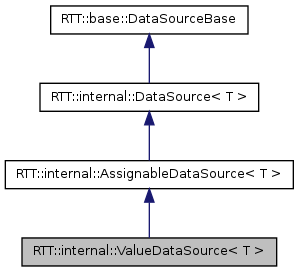#include <DataSources.hpp>

Public Types | |
| typedef boost::intrusive_ptr < ValueDataSource< T > > | shared_ptr |
Public Member Functions | |
| virtual ValueDataSource< T > * | clone () const |
| virtual ValueDataSource< T > * | copy (std::map< const base::DataSourceBase *, base::DataSourceBase * > &replace) const |
| DataSource< T >::result_t | get () const |
| AssignableDataSource< T > ::const_reference_t | rvalue () const |
| template<> | |
| void | set (AssignableDataSource< std::string >::param_t t) |
| void | set (typename AssignableDataSource< T >::param_t t) |
| AssignableDataSource< T > ::reference_t | set () |
| template<> | |
| RTT_API void | set (AssignableDataSource< std::string >::param_t t) |
| DataSource< T >::result_t | value () const |
| template<> | |
| ValueDataSource (std::string t) | |
| ValueDataSource (T data) | |
| ValueDataSource () | |
| template<> | |
| RTT_API | ValueDataSource (std::string t) |
| ~ValueDataSource () | |
Protected Attributes | |
| DataSource< T >::value_t | mdata |
Detailed Description
template<typename T>
class RTT::internal::ValueDataSource< T >
A simple, yet very useful DataSource, which keeps a value, and returns it in its get() method. This is an AssignableDataSource, which thus can be changed.
- Parameters:
-
T The result data type of get().
Definition at line 60 of file DataSources.hpp.
Member Typedef Documentation
| typedef boost::intrusive_ptr<ValueDataSource<T> > RTT::internal::ValueDataSource< T >::shared_ptr |
Use this type to store a pointer to an AssignableDataSource.
Reimplemented from RTT::internal::AssignableDataSource< T >.
Definition at line 72 of file DataSources.hpp.
Constructor & Destructor Documentation
| RTT::internal::ValueDataSource< T >::~ValueDataSource | ( | ) |
Use shared_ptr.
| RTT::internal::ValueDataSource< T >::ValueDataSource | ( | T | data | ) |
| RTT::internal::ValueDataSource< T >::ValueDataSource | ( | ) |
| RTT::internal::ValueDataSource< std::string >::ValueDataSource | ( | std::string | t | ) |
Definition at line 51 of file DataSources.cpp.
| RTT_API RTT::internal::ValueDataSource< std::string >::ValueDataSource | ( | std::string | t | ) |
Specialisation for std::string to keep capacity when clone() is called.
Member Function Documentation
| virtual ValueDataSource<T>* RTT::internal::ValueDataSource< T >::clone | ( | ) | const [virtual] |
Return a shallow clone of this DataSource. This method returns a duplicate of this instance which re-uses the DataSources this internal::DataSource holds reference to. The clone() function is thus a non-deep copy.
Implements RTT::internal::AssignableDataSource< T >.
| virtual ValueDataSource<T>* RTT::internal::ValueDataSource< T >::copy | ( | std::map< const base::DataSourceBase *, base::DataSourceBase * > & | replace | ) | const [virtual] |
Implements RTT::internal::AssignableDataSource< T >.
| DataSource<T>::result_t RTT::internal::ValueDataSource< T >::get | ( | ) | const [inline, virtual] |
Return the data as type T.
Implements RTT::internal::DataSource< T >.
Definition at line 78 of file DataSources.hpp.
| AssignableDataSource<T>::const_reference_t RTT::internal::ValueDataSource< T >::rvalue | ( | ) | const [inline, virtual] |
Get a const reference to the value of this DataSource. You must call evaluate() prior to calling this function in order to get the most recent value of this attribute.
- Note:
- Getting a reference to an internal data structure is not thread-safe.
Implements RTT::internal::DataSource< T >.
Definition at line 95 of file DataSources.hpp.
| void RTT::internal::ValueDataSource< std::string >::set | ( | AssignableDataSource< std::string >::param_t | t | ) |
Definition at line 45 of file DataSources.cpp.
| void RTT::internal::ValueDataSource< T >::set | ( | typename AssignableDataSource< T >::param_t | t | ) |
| AssignableDataSource<T>::reference_t RTT::internal::ValueDataSource< T >::set | ( | ) | [inline, virtual] |
Get a reference to the value of this DataSource. Getting a reference to an internal data structure is not thread-safe.
Implements RTT::internal::AssignableDataSource< T >.
Definition at line 90 of file DataSources.hpp.
| RTT_API void RTT::internal::ValueDataSource< std::string >::set | ( | AssignableDataSource< std::string >::param_t | t | ) |
Specialisation for std::string to keep capacity when set( ... ) is called.
| DataSource<T>::result_t RTT::internal::ValueDataSource< T >::value | ( | ) | const [inline, virtual] |
Return the result of the last evaluate() function. You must call evaluate() prior to calling this function in order to get the most recent value of this attribute.
Implements RTT::internal::DataSource< T >.
Definition at line 83 of file DataSources.hpp.
Member Data Documentation
DataSource<T>::value_t RTT::internal::ValueDataSource< T >::mdata [mutable, protected] |
Definition at line 64 of file DataSources.hpp.
The documentation for this class was generated from the following file: